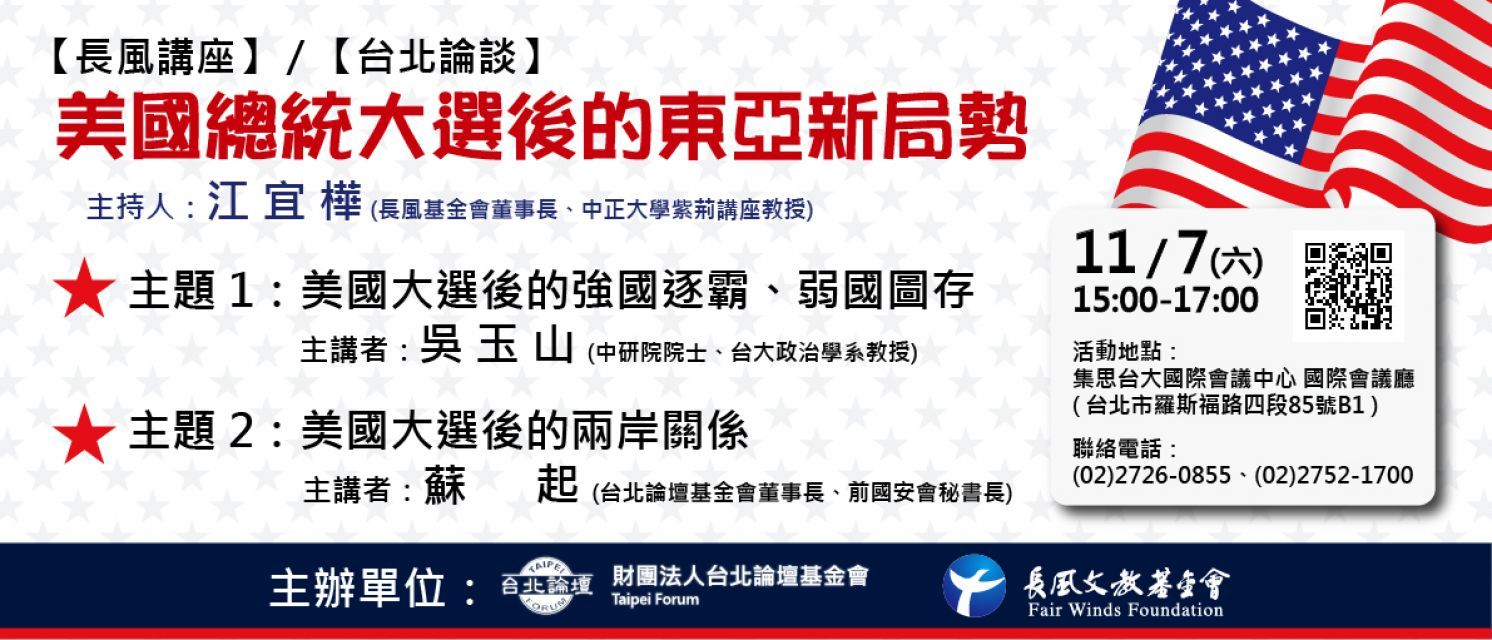
The New State of Affairs in East Asia After the U.S. Presidential Election
The 2020 United States presidential election is the most antagonistic, chaotic, and confusing election in the past century. No matter the outcome of the election, it will have a major impact on the United States itself and other countries in the world. Especially for East Asia, including China, Taiwan, Japan, and South Korea, what policies and measures the president of the United States will adopt will affect the future survival and development of all countries. In view of the importance of this election, the Fair Winds Foundation and Taipei Forum are pleased to invite academician Wu Yu-shan of the Academia Sinica and Professor Su Chi, former secretary-general of the National Security Council, to analyze in depth the impact of the U.S. presidential election on East Asia and cross-strait relations. The speeches of the two heavyweight scholars s expected to impress, and we welcome everyone interested to register.
Time: Saturday, November 7 3 PM—5 PM
Moderator: Jiang Yi-huah (Chairman, Fair Winds Foundation; Bauhinia Chair Professor, National Chung Cheng University)
Topic 1: Contest for Hegemony and Struggle for Survival After the U.S. Election
Speaker: Wu Yu-shan (Academician, Academia Sinica; Professor, Department of Political Science, National Taiwan University)
Topic 2: Cross-Strait Relations After the U.S. Election
Speaker: Su Chi (Chairman, Taipei Forum; Former Secretary-General, National Security Council)
Venue:
The Forum, GIS NTU Convention Center (B1, No. 85, Sec. 4, Roosevelt Rd., Da’an Dist., Taipei City 106)
Speaker Profiles
Professor Wu Yu-shan is an academician of the Academician Sinica, distinguished researcher and founding director of the Institute of Political Science, Academia Sinica, and co-appointed professor of the Department of Political Science, National Taiwan University. He is also the current chairman of the Chinse Political Society. He formerly served as the convener of the political science department of the National Science Council.
His research interests include political and economic transformation of socialist countries, democratization and constitutional design, cross-strait relations, and international relations theory.
Professor Wu has authored and edited 20 Chinese and English books and 140 Chinese and English journals and book papers. He has won the Best Doctoral Dissertation Award of the American Political Science Association, Outstanding Research Award of the National Science Council three times, and the first Teaching Excellence Award of National Taiwan University, academic award of the Ministry of Education, two special research awards of the National Science Council, an outstanding special researcher award, among other academic honors. In addition to multiple Chinse books, Professor Wu is author of the English books The Chinese Models of Development: Global, Local and Comparative Perspectives (2014) and Semi=presidentialism Across Continents: A Dialogue Between Asia and Europe (2015).
Professor Su Chi currently serves as chairman of the Taipei Forum Foundation and an honorary professor of the Graduate Institute of National Development, National Chengchi University (NCCU). He graduated from the Department of Diplomacy, NCCU, received his master degree from the Johns Hopkins University and doctoral degree in political science from Columbia University, and conducted post-doctoral research at Harvard University.
After returning to Taiwan, he taught at the Department of Diplomacy, NCCU, and the Graduate Institute of China Studies, Tamkang University.
In addition to multiple Chinse books, Professor Su is the author of the English book Taiwan’s Relations with Mainland China—A Tail Wagging Two Dogs and numerous papers in Chinse and English. His opinion articles have been published in many media sources, including the New York Times and Newsweek.
2. When registering, please provide an accurate e-mail address. In order to maintain the quality of our events, the organizer may approve or deny attendees.
3. The organizer reserves the right to modify the event agenda or speaker(s). Any adjustments will be posted on the event page.